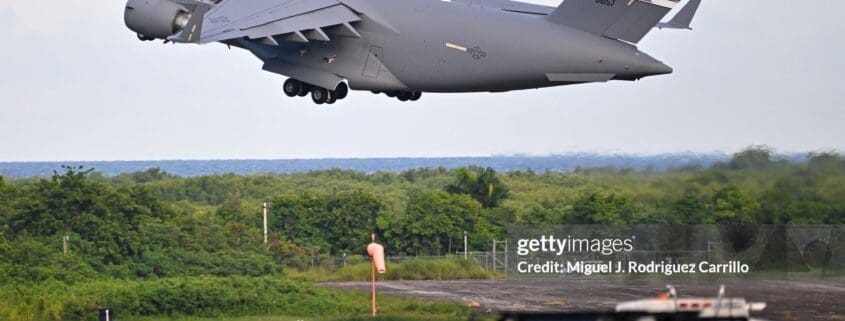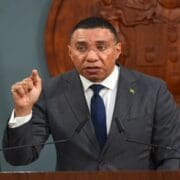Fifth US Strikes Near Venezuela Brings Death Toll To 27
By NAN Caribbean Desk
News Americas, Miami, FL, Tues. Oct. 15, 2025: The US strikes near Venezuela is turning deadlier by the week. Donald Trump today confirmed a fifth strike killing six more “just off the coast,” bringing the regional death toll to 27.
A Boeing C-17 Globemaster departs from José Aponte de la Torre Airport, formerly Roosevelt Roads Naval Station, on September 12, 2025, in Ceiba, Puerto Rico. The Trump administration recently carried out a drone strike in the southern Caribbean against a boat that had left Venezuela and was suspected of transporting drugs. Eleven people died in the attack. The president claimed that the vessel was operated by the Venezuelan gang Tren de Aragua. (Photo by Miguel J. Rodríguez Carrillo/Getty Images)
President Donald Trump announced the latest strike on social media Tuesday, claiming the vessel targeted was “affiliated with a Designated Terrorist Organization conducting narcotrafficking.” The administration has provided no evidence to substantiate the link, nor identified the nationality of the victims.
Legal and human rights experts have condemned the operations as extrajudicial killings, arguing that suspected drug smugglers are civilians – not enemy combatants – and that the military cannot lawfully target them outside of an active armed conflict. Congress has not authorized the use of force against criminal cartels or drug traffickers.
New Joint Task Force Announced
The escalation came just four days after the U.S. Southern Command (SOUTHCOM) announced the formation of a new Joint Task Force (JTF) under the II Marine Expeditionary Force (II MEF) to “synchronize and augment counter-narcotics efforts” across the Western Hemisphere.
According to SOUTHCOM, the task force will:
Integrate the capabilities of II MEF with Homeland Security and other U.S. agencies;
Expand aerial surveillance and maritime patrols;
Enhance intelligence fusion and rapid-response capacity;
Conduct joint training with regional forces and advise partner nations on counter-narcotics operations.
Adm. Alvin Holsey, SOUTHCOM Commander, who was said to be visiting Grenada today, said the goal is to “detect, disrupt, and dismantle illicit trafficking networks faster and at greater depth.”
Lt. Gen. Calvert Worth, head of II MEF and now JTF Commander, added that his team “will leverage maritime patrols, aerial surveillance, precision interdictions, and intelligence sharing to counter illicit traffic and uphold the rule of law.”
Regional Unease
Holsey’s visit this week to Grenada – his first since assuming the Command – has already sparked public concern in Grenada, where reports surfaced that Washington has requested permission to install US radar equipment and technical personnel at the Maurice Bishop International Airport.
The Grenadian government confirmed it is “carefully assessing” the U.S. request, citing the need to protect national sovereignty, tourism safety, and public interest. “The Ministries of National Security, Legal Affairs and Foreign Affairs are carefully assessing the request and reviewing the request in technical consultations, in coordination with the Grenada airports Authority and other relevant agencies,” the Dickon Mitchell government said, adding that it is carefully reviewing the request in accordance with established national procedures.
“Any decisions will be made only after all technical and legal assessments are completed. We wish to assure our citizens that any decision taken will be guided by Grenada’s sovereignty, public safety, and national interest, including the protection of our tourism industry, the traveling public, and the country’s economic well-being,” the government said, adding it continue to keep the public informed as developments unfold.
However, former Senate President Chester Humphrey and ex-Foreign Minister Peter David have warned that the move could be a precursor to U.S. military action against Venezuela.
David said while Grenada values its long-standing ties with both Washington and Caracas, “unilateral action… perceived as hostile will be both counterproductive and destabilizing.”
Antigua and Barbuda Prime Minister Gaston Browne, says his country has absolutely no interest in hosting any form of military assets, and that the situation regarding Grenada is “really a sovereign issue” for the government of that island.
“If they decide to accommodate the United States, there is nothing we can do. We would have to respect the decision,” Browne told reporters on a conference call from St. John’s.
Regional Implications
Analysts say the combination of lethal strikes and expanded U.S. presence marks a dramatic militarization of Caribbean waters, raising new questions about sovereignty, legality, and the region’s role in America’s “war on drugs.”
Critics argue that the Caribbean — long a zone of peace and cooperation on maritime security — is being transformed into a forward operating theater for U.S. military operations, with little transparency or regional consultation. Critics, including congressional Democrats, legal scholars, and human rights groups, have stressed that even if any of the boats recently bombed by the Trump administration were trafficking drugs, the strikes still violate international and federal law. Such criticism has not deterred the administration. Amnesty International USA declared: “This is murder. The US government must be held accountable.”









Leave a Reply
Want to join the discussion?Feel free to contribute!